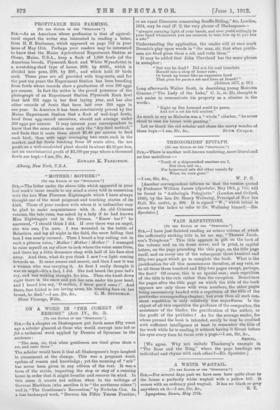ON A WORD IN "THE COMEDY OF ERRORS" (ACT IV.,
Sc. 3).
pro ,r111: EDITOR OF THE " SPECTATOR."] SIR,—In a chapter on Shakespeare put forth some fifty years ago a scholar glanced at those who would corrupt into bob or fob a technical word applied by Dromio of Syracuse in the sentence : "The man, sir, that when gentlemen are tired gives them a sob, and rests them."
The scholar• would have it that all Shakespeare's boys laughed in amazement at the change. This was a pregnant word, spoken of reason and knowledge ; yet the meaning of " sob " has never been given in any edition of the text. It was a term of the stable, imparting the stop or stay of a running horse in order that it might breathe and recover its wind. In this sense it occurs not seldom when in the writings of Gervase Markham (who ascribes it to " the northern riders ") and in " The Gentleman's Recreation," by Nicholas Cox. In a lees hackneyed work, " Browne his Fiftie Yearea Practice;
or an exact Discourse concerning Snaffle Riding," 4to, London, 1624, may be read (F. 2) the very phrase of Shakespeare- " alwayes carrying light of your hando, and ever yeeld willingly to your hand whensoever you see occasion to take him up to give kiln a sobs."
Understanding the application, the reader will at once mark Dromio's play upon words in "the man, sir, that when gentle-
men are tired gives them a sob, and rests them."
It may be added that John Cleveland has the same phrase in metaphor :
"But was he dead ? Did not his soul translate
Herself into a shop of lesser rate;
Or break up house like an expensive Lord That gives his purse a sob and lives at Board?"
(Edition 1677, p. 29.) Long afterwards Walter Scott, in describing young Malcolm Graeme (" The Lady of the Lake," C. ii., at. 25), thought it not amiss to remonstrate his property as a climber in the words
"Right up Ben Lomond could he press, And not a sob his toil confess."
As much to say as Malcolm was a " whole" climber, " he never stood to ease his breast with panting."
Let us thank the old scholar• and share the merry wonder of






































 Previous page
Previous page